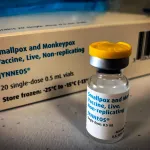Last week, news broke that many federal bureaus were taking down websites and data sets to comply with President Donald Trump’s executive order saying the government recognizes only two genders.
A follow-up memo from the Office of Personnel Management said any official agency documents antithetical to the order needed to be corrected or eliminated.
Federal employees scrambled to comply with the issued guidance, sometimes removing any information that alluded to gender. Previously accessible webpages from the Centers For Disease Control (CDC), Department of Justice (DOJ) and Environmental Protection Agency (EPA) returned 404s. Pages addressing LGBTQ+ health, women’s health and HIV were among those removed.
As federal employees were directed to scrub sites by Friday at 5 p.m., The 19th, alongside many other news organizations, jumped into archival action.
Here is a sample of the government documents The 19th preserved for future access and accountability:
- Maternal mortality data from the CDC
- Abortion and contraception data from the CDC
- Reports on violence against Native American women from the DOJ
- Research studies on teens, including the mental health of girls and LGBTQ+ youth
- Guidelines from the National Academies on how to best collect data about gender and sexuality
- Report on women in the workforce from the Bureau of Labor Statistics
- Information from the DOJ’s Office on Violence Against Women
The executive order and accompanying memos were vague, and it was unclear what information would or would not remain available to the public. Some of what we downloaded is still available on agency websites, but we backed it up — just in case.
Many snapshots of government websites were saved by the End Of Term Archive, which backs up information to the nonprofit Internet Archive website before presidential administrations change. Researchers, journalists and self-described “data hoarders” are working together to create a shareable archive of government data.
The Association of Health Care Journalists has assembled a resource for reporters navigating the loss of federal data sets. There is a grassroots collaborative effort to share downloaded CDC information, and the Internet Archive has posted a bundled collection of CDC data.
“The affected data contain invaluable historical and contemporary information about our nation’s health and well-being produced by agencies,” wrote the presidents of the Population Association of America and the Association of Population Centers in a joint statement.
The Association of Public Data Users urged the immediate restoration of removed datasets in a statement. “Put quite simply, today’s actions to remove taxpayer-funded data from the public domain impacts everyone in the United States, directly contradicts the mission of the federal statistical system, and robs the public of a benefit paid for by them.”





